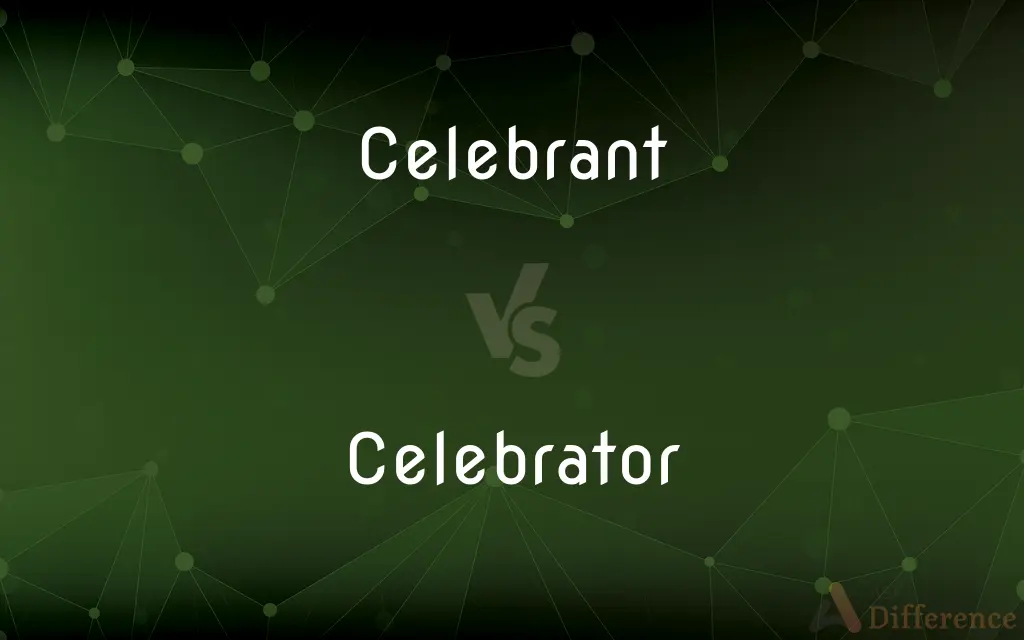Celebrant vs. Celebrator — What's the Difference?
By Urooj Arif & Maham Liaqat — Updated on March 29, 2024
Celebrant is someone who officiates at a ceremony, especially a religious one, while a celebrator is anyone who takes part in a celebration.

Difference Between Celebrant and Celebrator
Table of Contents
ADVERTISEMENT
Key Differences
A celebrant is specifically involved in conducting formal ceremonies, such as weddings, funerals, or religious rites, often requiring official recognition or ordination. On the other hand, a celebrator is a person who participates in or enjoys celebrations, without any implication of an official role.
While the role of a celebrant is defined by their responsibilities and authority to perform ceremonies, a celebrator's involvement is characterized by personal or communal enjoyment and participation in an event. Celebrants often need to meet certain qualifications or receive specific training to officiate at ceremonies, whereas celebrators simply join in the festivities out of personal choice or cultural tradition.
In many cultures, the distinction is important for legal and ceremonial purposes, as celebrants may sign official documents, such as marriage certificates, legitimizing their role in the ceremony. Conversely, celebrators contribute to the festive atmosphere, sharing in the joy and social aspects of the occasion.
The term celebrant can also be used in a more general sense to refer to anyone celebrating something, but this usage is less common and typically context-dependent. Celebrators, meanwhile, encompass a wide range of individuals from guests at a birthday party to attendees of public events like festivals or national holidays.
Technological and social changes have broadened the roles of celebrants, with non-religious or secular celebrants becoming more common in various ceremonies, reflecting a shift in societal values towards inclusivity and personal choice. Celebrators, too, have found new ways to partake in celebrations, with digital platforms enabling people to join in festivities virtually from anywhere in the world.
ADVERTISEMENT
Comparison Chart
Role
Officiates ceremonies
Participates in celebrations
Requirement
Often requires official recognition or ordination
No formal requirements, just participation
Involvement
Formal and defined by duties
Informal and defined by personal or communal enjoyment
Authority
May have legal authority in ceremonies
Has no official authority
Types of Events
Weddings, funerals, religious ceremonies
Any celebration, from birthdays to public holidays
Compare with Definitions
Celebrant
Needs specific qualifications.
He became a certified celebrant after completing the required course.
Celebrator
Anyone who takes part in or enjoys celebrations.
The room was filled with celebrators singing and dancing.
Celebrant
Conducts formal ceremonies.
As a celebrant, she has officiated at numerous ceremonies over the years.
Celebrator
Characterized by enjoyment.
The celebrators brought gifts and good wishes to the event.
Celebrant
A person who officiates at a ceremony, especially a religious one.
The celebrant at the wedding was a close friend of the couple.
Celebrator
None required.
Everyone at the festival was a celebrator, sharing in the communal joy.
Celebrant
May sign official documents.
The celebrant signed the marriage certificate, making the union official.
Celebrator
Encompasses a wide range of celebrations.
Celebrators at the national holiday parade showed their patriotic spirit.
Celebrant
Plays a key role in the ceremony's execution.
The celebrant prepared a personalized speech for the ceremony.
Celebrator
Participates in celebrations.
As a celebrator, she loves attending birthday parties and festive gatherings.
Celebrant
A person who participates in a religious ceremony or rite.
Celebrator
To observe (a day or event) with ceremonies of respect, festivity, or rejoicing.
Celebrant
A person who officiates at a religious or civil ceremony or rite, especially a wedding.
Celebrator
To perform (a religious ceremony)
Celebrate Mass.
Celebrant
In some Christian churches, the cleric officiating at the celebration of the Eucharist.
Celebrator
To extol or praise
A sonnet that celebrates love.
Celebrant
A participant in a celebration.
Celebrator
To make widely known; display
"a determination on the author's part to celebrate ... the offenses of another" (William H. Pritchard).
Celebrant
A person who officiates at a religious ceremony, especially a marriage or the Eucharist.
Celebrator
To observe an occasion with appropriate ceremony or festivity.
Celebrant
A person who conducts formal ceremonies in the community, particularly weddings, baby namings, renewals of wedding vows and funerals.
Celebrator
To perform a religious ceremony.
Celebrant
A person who is celebrating something.
Celebrator
To engage in festivities
Went out and celebrated after the victory.
Celebrant
One who performs a public religious rite; - applied particularly to an officiating priest in the Roman Catholic Church, as distinguished from his assistants.
Celebrator
A person who celebrates or praises.
Celebrant
A person who is celebrating
Celebrator
One who celebrates; a praiser.
Celebrant
An officiating priest celebrating the Eucharist
Celebrator
A person who is celebrating
Common Curiosities
Do celebrants need to be religious figures?
Not necessarily; there are secular celebrants for non-religious ceremonies.
Can anyone be a celebrator?
Yes, anyone participating in or enjoying a celebration can be considered a celebrator.
How does one become a celebrant?
Becoming a celebrant often requires undergoing specific training or certification, depending on the type of ceremonies they wish to officiate.
Can celebrants officiate at any type of ceremony?
Celebrants typically officiate ceremonies they are authorized for, which can vary based on their certification or ordination.
Can a celebrator influence the atmosphere of a celebration?
Absolutely, the energy and participation of celebrators significantly contribute to the overall atmosphere of a celebration.
How do cultural differences affect the roles of celebrants and celebrators?
Cultural differences can significantly impact the roles, with varying traditions and customs influencing how celebrations and ceremonies are conducted.
What are some common events for celebrators?
Birthday parties, weddings, festivals, and national holidays are common events where celebrators participate.
Who can be a celebrant?
A celebrant is usually someone officially recognized to conduct ceremonies, like weddings or funerals.
What makes a good celebrator?
A good celebrator is someone who actively participates in and contributes to the festive spirit of an event.
Are celebrants always required at weddings?
Legally, a wedding usually requires an officiant or celebrant to be recognized, though the specifics can vary by location.
Can a celebrant also be a celebrator?
Yes, a celebrant can also enjoy and participate in the celebration outside of their official duties.
How has technology affected celebrators?
Technology has enabled celebrators to join celebrations virtually and share moments with a wider audience through social media.
Is there a difference in the preparation between celebrants and celebrators?
Celebrants prepare by understanding the ceremony's requirements and the participants' wishes, while celebrators prepare by choosing how to participate or what to bring.
What impact do celebrators have on public celebrations?
Celebrators play a crucial role in the success and vibrancy of public celebrations, contributing to their energy and communal spirit.
Do celebrants work independently?
Many celebrants work independently, while others may be associated with religious institutions or celebrant organizations.
Share Your Discovery

Previous Comparison
Constrict vs. Dilate
Next Comparison
Sensor vs. ActuatorAuthor Spotlight
Written by
Urooj ArifUrooj is a skilled content writer at Ask Difference, known for her exceptional ability to simplify complex topics into engaging and informative content. With a passion for research and a flair for clear, concise writing, she consistently delivers articles that resonate with our diverse audience.
Co-written by
Maham Liaqat















































